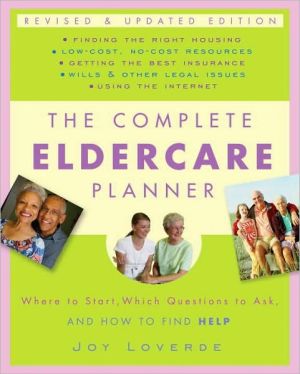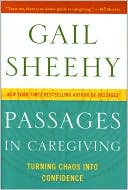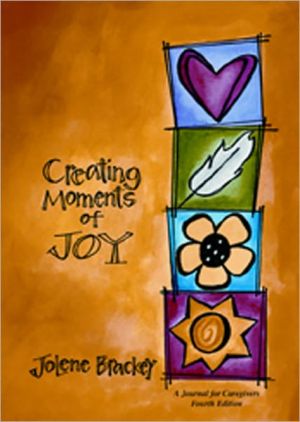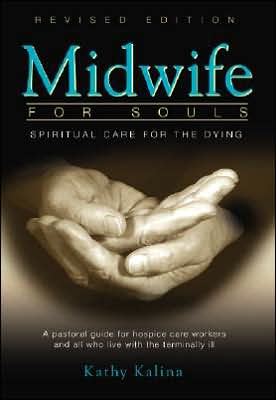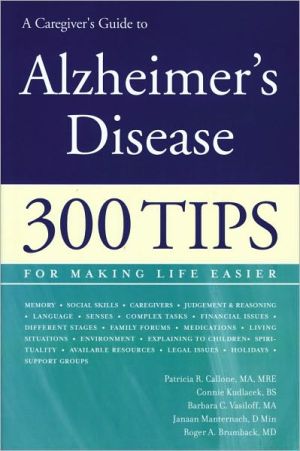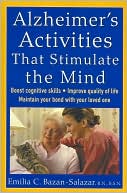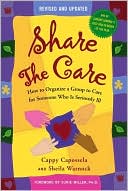The Complete Eldercare Planner: Where to Start, Which Questions to Ask, and How to Find Help
The only guide you’ll ever need to manage the care of your aging family\ FULLY REVISED AND UPDATED\ As our population shifts and ages, the care needs for our elders continue to change and evolve. Today’s generation of family and professional caregivers faces new decisions and challenges, as well as previously unavailable options. This thoroughly revised and updated 2009 edition of The Complete Eldercare Planner equips you with reliable, up-to-the-minute information to help you plan and manage...
Search in google:
The only guide you’ll ever need to manage the care of your aging family FULLY REVISED AND UPDATEDAs our population shifts and ages, the care needs for our elders continue to change and evolve. Today’s generation of family and professional caregivers faces new decisions and challenges, as well as previously unavailable options. This thoroughly revised and updated 2009 edition of The Complete Eldercare Planner equips you with reliable, up-to-the-minute information to help you plan and manage caring for your loved ones.Comprehensive and detailed, sensitive and realistic, practical and accessible, the 2009 edition provides even more tips on prioritizing and organizing caregiving tasks, balancing work and family responsibilities, and navigating the complex maze of eldercare services. In addition to an expanded index of Internet resources and access to downloadable forms of key documents, you’ll find indispensable checklists, worksheets, step-by-step action plans, lists of questions to ask, low-cost and free alternative resources, and The Document Locator™. This new edition covers:•Getting started on creating a long-term care plan•Finding help, especially if you live far away•Managing the financial aspects•Talking to elders about sensitive subjects•Senior housing–move or stay put?•Managing medications•And many other topics of vital interest to anyone caring for an elder
Most of us are inadequately prepared, emotionally and otherwise, to face the complex issue associated with caring for elderly loved ones. Each situation usually involves multiple issues. How one family handles a problem is not necessarily the right approach for another, and what works one day could change drastically, overnight. How then do we proceed under these seemingly chaotic circumstances? The answer lies in planning.\ Planning, however, takes on a whole new level of meaning when it comes to eldercare. Existing family decision-making patterns will no longer apply, and we soon realize we will not be returning to our past lifestyles. What we can plan on is that ongoing changes in the eldercare process will surely impact the rest of the family, sometimes suddenly, sometimes so gradually that we may not even notice the change.\ The true nature of assisting an elderly parent, spouse, or other family member includes a roller coaster of emotional upsets, and consequently the process of care giving requires constant management of our attitudes and decisions. The Complete Eldercare Planner is your road map through this unfamiliar territory. Here are some suggestions to help you make the most of this book:Read the Introduction and the Objectives section at the beginning of each chapter. Knowing the basis for what you are reading, and why, will be especially helpful when the emotional aspect of assisting your loved one threatens to undermine your ability to accomplish what you want.As you finish reviewing the chapter, set goals with the help of the Eldercare Goals chart found on page 286 in chapter 14. Track your progress by referring to the Action Checklists at the end of each chapter. Effective planning is specific, realistic, and written.Start to fill out the Elder Emergency Information Chart on page xiii today. Finally, for quick reference to eldercare resources, websites, charts, and worksheets listed throughout The Planner, turn to the Index sections at the end of the book. You now have the tools you need to get started.\ A PLACE TO STARTPlanning and preparation are critical for effective elder care.\ Experts agree that rule number one in thoughtful planning is to use some form of planner to write things down.\ Whether you are planning for future eldercare needs or helping an elderly relative in a crisis situation, The Complete Eldercare Planner will assist you and your family in pulling it all together.\ OBJECTIVES After completing A Place to Start, you will be able to:Create opportunities to open up the lines of communication.\ Minimize the number of crisis situations.\ Reduce confusion in crisis situations.\ Gain greater peace of mind by planning ahead.\ Plan One\ Don't read this book. Use it.\ This planner is specifically designed and organized to help you understand and manage issues associated with assisting an aging parent, spouse, or other family member or friend. The Complete Eldercare Planner offers immediate solutions to common problems by way of time saving action plans, charts, worksheets, and checklists. Make use of the spaces provided for listing telephone numbers, setting goals, and locating documents. At the end of every chapter you will also find an in-depth list of resources to give you the additional support you will need.\ Decide what works best for you. How you use The Complete Eldercare Planner depends on the nature of your eldercare situation, your family's decision patterns, the help you receive from others, eligibility into specialized programs, and the availability of financial resources. You may choose to implement one plan, several plans, or even a combination of plans. A plan may work one day and not the next. Flexibility will be one of the keys to your effectiveness as a family caregiver.\ The process of assisting an elderly family member requires an ongoing assessment of the situation at hand. Nothing stays the same in eldercare; aging people are constantly in transition. Open up the lines of communication early with elders and family members, and seek the advice of geriatric care professionals when you need additional support. Making assumptions about what is happening instead of talking to each other always does more harm than good. Operate from fact, not fiction.\ Keep your planning and time line expectations realistic. Ask yourself on a regular basis these three simple questions: What can happen? What will my elder be able to do about what happens? What can the rest of the family do to help?\ Plan early. The well-being of the entire family depends on the quantity and quality of your eldercare options, decisions, and plans.\ Plan Two\ Implement planning principles\ Follow these six basic planning principles:\ Set goals. Know what you are doing and why. Effective goal setting is specific, realistic, and written. Make use of the Goals Chart on p. 286.\ Create support systems and use them. Surround elderly family members with people both inside and outside the family, as well as community assisted-living resources to share responsibilities and protect against family caregiver stress.\ Write everything down. Put dates on all notes. Record plans, goals, ideas, phone numbers, questions, answers, promises, decisions, tasks, and appointments and keep them in a convenient, accessible location. Make good use of the forms in this planner.\ Organize information. Keep notes, bills, receipts, contracts, letters, brochures, and all other eldercare-related information in a safe, twenty-four-hour accessible place. Create a system that makes it easy for you to find information and answers when you need them.\ Allow sufficient time for research. Gathering information and creating options is critical to thoughtful action. Research more than one option. Research all costs and who pays.
\ Library JournalRegarded as an expert on elder care, Loverde in this practical workbook covers legal, financial, communication, emotional, health, and end of life issues, with concrete objectives and action plans for a variety of situations, including how to decide if it's best for your elder parent to move in. (LJ 6/1/97)\ \
